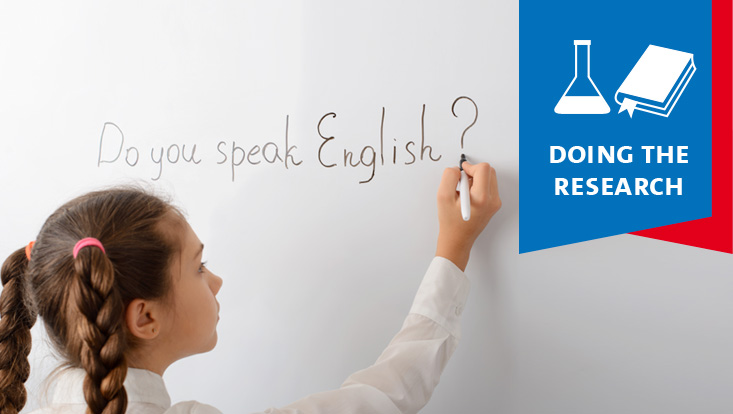Comparing English and math lessonsTaking a Risk: Teachers and Handling UncertaintyDoing the Research series
28 February 2024, by Anna Priebe

Photo: iStock/Vitalii Petrushenko
Lessons characterized by group work, in a foreign language that constantly changes and is often spoken differently in everyday life than it was at school: English teachers often face uncertainty. Prof. Dr. Andreas Bonnet and Ioana Chiotoroiu from the Faculty of Education explain in the interview below how to deal with uncertainty, the role that a teacher’s biography plays, and what this means for teacher training.
“I go into class everyday feeling uncertain.” It is rare to hear teachers make such statements so directly. So how do you study uncertainty?

Chiotoroiu: It is not really that teachers always go into the classroom full of uncertainty or that they explicitly say so, but rather that we notice it in the unconscious actions in the practical situations that we as researchers follow. We presume that teachers, just like the rest of us, develop this habitus—that is, how they experience uncertainty and how they deal with it—throughout the course of their lives.
To get to the bottom of this, we are conducting interviews in which we let teachers talk extensively about their development and their classroom teaching. The questions are relatively open and the conversations can last up to 2 hours.
What concretely leads to classroom uncertainty on the part of English teachers?
Chiotoroiu: Generally, all teachers, regardless of subject, have what is called a “generic uncertainty.” For while they teach with tried-and-true methods, they cannot plant the information directly into their pupils’ heads. The same is true, naturally, for us at the University: there is always a bit of uncertainty about whether students take in or use their knowledge or not.
And then there are subject-specific uncertainties?
Chiotoroiu: Yes, and those begin, indeed, with linguistic matters, meaning vocabulary, because language is always many-sided. Individual words can have many meanings and language changes constantly. What words mean and how you use them is not 100 percent clear.

Bonnet: Another thing that plays a big role in English lessons is grammar. And school grammar is a very simplified formulaic language. The classic examples are “if” sentences. At school, we learn the 3 types and how you use them. In everyday spoken language and in literature, you hardly encounter them in this pure form. This usually falls by the wayside at school and then teachers act as if the 3 types of “if” sentences are clear.
Then there is the fact that the lessons themselves are taught in the foreign language. There are studies of teachers that show that English teachers have problems developing what is called “professional confidence,” or a positive image of themselves as a teacher. They are internally convinced that native speakers are better English teachers; but they themselves are not. We English teachers teach, basically, with a permanent inferiority complex. This is totally unnecessary, even absurd, but that is how we were socialized throughout our own schooling.
Can you give us an example of this kind of uncertainty in the classroom?
Bonnet: In cooperative learning, the goal is that pupils develop their knowledge together in groups. As a teacher, you should not actually even intervene and give frontal instruction only in bits. This also means that in cooperative lessons, there is no central certainty about the acquisition of the material at the end of the lesson; you leave it to the group. In our last research project, however, teachers did intervene and summarized everything, even though they had resolved not to do so.
In your research, you also compare the handling of uncertainty among teachers in different subject areas.
Bonnet: In cooperation with colleagues from the University of Marburg we are comparing math and English teachers.
Chiotoroiu: And we are beginning to recognize differences in handling uncertainty that could be specific. But we still can’t make definitive statements because we are still in the research process. But we can say that uncertainty is present in both subjects equally.
Bonnet: In addition to math and English teachers, we also have a comparison group from the United States, namely teachers there who teach English as a second language, for example, to children from immigrant backgrounds. They experience uncertainty at a much more fundamental level and don't see themselves as language teachers but as social workers. In their case, it’s about enabling children to be part of the majority culture or also dealing with the fear of deportation.
How are you using the findings? To put it bluntly, should only people with a certain background become teachers?
Bonnet: No, we are concerned with something else. We have realized, among other things, that the question as to whether someone uses, for example, cooperative learning in the classroom does not depend on whether the person has a lot of knowledge about it. There are teachers who have even written essays about cooperative learning and who still don’t use it.
The decision seems to depend a lot more on how the teacher deals with uncertainty and how much they trust their students’ abilities. It is made at a much deeper level that forms throughout life. Can I bear uncertainty and even appreciate it? How much need do I have to control things or how much trust do I have? However, it is not about how much that characterizes a person but the question: what do I, as a person, do with this disposition? And this is where the education of teachers begins.
Chiotoroiu: We have to make ourselves aware of these predispositions and incorporate the research findings into teacher training— the experiences during our studies influence how the students themselves will teach. It seems to be that the kind of program is even more important for one’s later teaching practices than the theories we give them. This means that students can change their intolerance of uncertainty during their studies. For example, we consciously try to live a positive culture of errors and not to preach.
We are developing a module exam together with our students.
Bonnet: Exams are an important topic here. We have introduced a common setting in which we develop the module exam together to teach them first-hand cooperative learning. Most of them are unfamiliar with this because you are normally always told the kind of exam you will take at the beginning of the semester. This doesn’t work with cooperative learning. This is very confusing for the students and some keep on asking: So what does the exam look like? But we are looking together at the material to focus on and how we should test it: Is this about reflecting? Or more about knowing facts?
So radically cooperative.
Bonnet: Yes, you could express it like that. For us, it’s just important to consider alternative classroom scenarios and make it possible for students to have new perspectives. Later it is their own professional decision about what kind of lessons they want to conduct in their school. For example, we have several international programs where students learn about lessons in Ghana or the United States. Studies show that students, if these experiences are well-supervised, are puzzled at first but then learn to deal better with uncertain situations.
Are there also some ideas for classroom practice?
Bonnet: We will definitely develop further education opportunites for teachers based on our research. We are currently cooperating on a knowledge exchange project with a district school. It is just now being founded and we will guide the process. There will be open classrooms and completely new teaching concepts. We will consolidate our knowledge but where that will lead to, time will tell.
The project
The research project Professionalisierung von Mathematik- und Englischlehrpersonen (ProME) is part of the faculty’s research focus Ungewissheit als Dimension pädagogischen Handelns, in which uncertainty is regarded from different perspectives. Prof. Dr. Andreas Bonnet, professor of education (teaching English language and literature), and Ioana Chiotoroiu, research associate in the area, are taking a theoretical approach to the profession and focusing on teachers’ activities, their professional identity, and the growing demands upon teacher training. They are cooperating with, among others, Prof. Dr. Uwe Hericks from the Department of Education at the University of Marburg.
Doing the Research
There are approximately 6200 academics conducting research at 8 faculties at Universität Hamburg. Many students also often apply their newly acquired knowledge to research practice while still completing their studies. The Doing the Research series outlines the broad and diverse range of the research landscape, and provides a more detailed introduction of individual projects. Feel free to send any questions and suggestions to the Newsroom editorial office.


